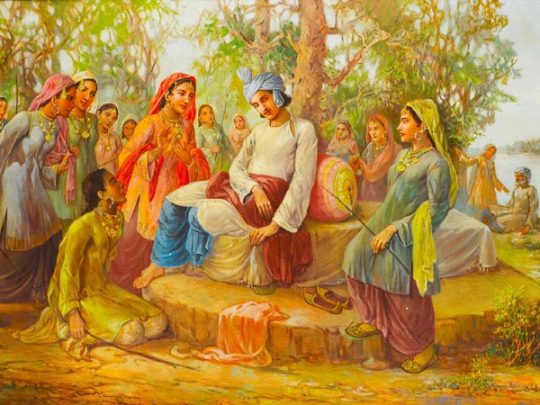#SUFI KALAM
Explore tagged Tumblr posts
Text
Sufinama: A Journey Through the World of Sufism
Sufinama: A Journey Through the World of Sufism
Sufism, an ancient mystical tradition, transcends boundaries of time and space, encompassing poets, saints, and seekers of divine love. In this comprehensive guide, we embark on a journey through the rich tapestry of Sufinama, exploring its diverse facets, from poetry and music to spiritual teachings and stories. Let us delve deep into the essence of Sufism and unravel its timeless wisdom.
Poetic Gems of Sufism: Sufi poetry, with its sublime beauty and profound symbolism, serves as a beacon of light for seekers on the path of love and devotion. From the ecstatic verses of Rumi and Hafiz to the soul-stirring couplets of Kabir and Bulleh Shah, explore the transcendent power of words that echo the longing of the human soul for union with the Divine.
1. Sufis/Sants: The luminous souls known as Sufis or Sants exemplify the highest ideals of love, compassion, and humility. Through their exemplary lives and teachings, they illuminate the path of spiritual awakening and inspire countless seekers to tread the path of inner transformation.
2. Sant Vani: Sant Vani, the divine utterances of saints, resonates with the eternal truths of existence. Immerse yourself in the timeless wisdom of Sant Kabir, Sant Tukaram, and other revered saints as they impart profound insights into the nature of reality and the essence of divine love.
3. Sufi Qawwali: Sufi Qawwali, the soul-stirring devotional music, transports listeners to realms beyond the mundane, awakening the heart to the ecstasy of divine love. Experience the mesmerizing melodies and ecstatic rhythms that characterize this rich musical tradition, celebrating the union of lover and Beloved.
4. Sufi Kalam: Sufi Kalam, the mystical poetry set to music, serves as a vehicle for spiritual transformation and transcendence. Delve into the depths of Sufi Kalam as it weaves together themes of love, longing, and surrender, inviting listeners to embark on a journey of inner awakening and self-discovery.
5. Sufi Prose: Sufi Prose, imbued with wisdom and insight, offers invaluable guidance on the path of self-realization and spiritual enlightenment. Explore the profound teachings of Sufi masters through their timeless writings, which illuminate the mysteries of existence and the journey of the soul.
6. Persian Dictionary: A comprehensive Persian dictionary serves as a valuable resource for students and enthusiasts seeking to deepen their understanding of Sufi literature and language. Discover the richness of Persian vocabulary and delve into the nuances of mystical terminology used by Sufi poets and scholars.
7. Sufi Stories: Sufi Stories, with their allegorical wisdom and timeless moral lessons, inspire and enlighten readers of all ages. Journey through enchanting tales of love, compassion, and spiritual awakening, as recounted by Sufi masters such as Jalaluddin Rumi, Attar, and Fariduddin Attar.
8. Sufi Music: Sufi Music, with its enchanting melodies and devotional lyrics, transcends cultural boundaries and touches the depths of the human soul. Experience the transformative power of Sufi music as it evokes states of ecstasy, reverence, and divine communion, inviting listeners to immerse themselves in the ocean of divine love.
9. Conclusion: Sufinama, a tapestry woven with threads of poetry, music, and spiritual wisdom, offers a glimpse into the mystical realm of Sufism. As we conclude our journey through the world of Sufism, may we carry with us the timeless teachings and blessings of the Sufi masters, guiding us on the path of love, light, and inner peace.
4 notes
·
View notes
Text
Shah ast Husain va bādshāh ast Husain
diin ast Husain o dīn-e-panāh ast Husain
sar dādan-o-na-dād dast dar dast-e-yazīd
vallāh ke bīna-e-Lā-ilāh ast Husain
-Khaja Ghareeb Nawaz
5 notes
·
View notes
Text
How does Sufi Kalam differ from other forms of poetry?
Sufi Kalam is a unique form of poetry that differs from other forms in several ways:
1. Spiritual focus: Sufi Kalam is deeply rooted in Islamic mysticism and spirituality, focusing on themes of love, devotion, and union with the Divine.
2. Symbolism and metaphors: It employs rich symbolism, metaphors, and allegories to convey spiritual concepts and emotions.
3. Use of Persian and Arabic: Sufi Kalam often incorporates Persian and Arabic words, phrases, and poetic structures, reflecting the cultural and linguistic heritage of Sufism.
4. Musical quality: Sufi Kalam is often composed to be sung or recited with musical accompaniment, creating a hypnotic and meditative atmosphere.
5. Emphasis on emotion: Sufi Kalam prioritizes emotional expression and intensity over intellectual or rational discourse.
6. Non-dualistic perspective: It often transcends binary oppositions, embracing a non-dualistic view of reality and the self.
7. Mystical themes: Sufi Kalam explores themes like love, longing, separation, union, and spiritual transformation.
8. Use of repetition: Repetition of words, phrases, or lines is common, creating a sense of rhythm and emphasizing key spiritual concepts.
Sufi Kalam's unique blend of spirituality, symbolism, and musicality sets it apart from other forms of poetry, making it a distinctive and powerful expression of Islamic mysticism.
#poetry#poets on tumblr#writers and poets#poetry is not dead#sufism#sufi kalam#religion#islamic knowledge#islamic jankari blog#islamic post#islamquotes#islamislove#islampost
1 note
·
View note
Text

#one world one smile#abida parveen#abida parveen sufi songs#abida parveen songs#abida parveen qawwali#abida parveen music#ghazals of abida parveen#abida parveen new songs#abida parveen sufi kalam#abida parveen status#abida parveen dhamaal#abida parveen ghazal#kuchh is ada se aaj#abida parveen kalam#sufi of abida#kuch is ada se aaj by#best of abida sufi#best of abida#abida parven#tu ne deewana banaya#sufi music#ghazal#ghazal songs#sindhi
0 notes
Video
youtube
Best Sufi Kalam 2023 Soi Kismat Jagana Tera Kam Hai | Urdu Sufi 2023 | S...
0 notes
Link
Sultan Bahoo TV proudly presents the Part 27 of Sharah Abyat-e-Bahoo. Founder and Patron in Chief of Tehreek Dawat-e-Faqr and spiritual leader of Sarwari Qadri order Sultan-ul-Ashiqeen Sultan Mohammad Najib-ur-Rehman is delivering a series of special lectures on the interpretation of ‘‘Abyat-e-Bahoo’’ from his Urdu book "Abyat-e-Bahoo Kamil."
#abyatebahoo#abyatebahookamil#abyat#exegesis#kalamebahoo#kalam#sufism#sufi#speech#manqabat#saints#murshid#poetry#tasawuf#sultanulashiqeen#sultanbahoo#tehreekdawatefaqr
1 note
·
View note
Photo

Ranjha is an unforgettable tale that reminds us of the enduring power of love. This timeless narrative continues to inspire countless generations, transcending boundaries of time, culture, and language. Join us as we unravel the captivating journey of Heer and Ranjha, a love story that will touch your heart and leave you spellbound. Share this enchanting saga with your friends and let the world know that true love knows no limits! READ COMPLETE HEER RANJHA [14 CHAPTERS SHORTENED] AT https://ift.tt/gIhnmKj Also download Ranja Shah Hazar, beautiful kalam sung by Abida Parveen , the Sufi Queen, at https://ift.tt/3y95aQf #HeerRanjha #EternalLove #loveknowsnoboundaries https://ift.tt/VpD7Uwu
3 notes
·
View notes
Video
youtube
Kar Nekiyan Auni Kam Tere | Hashim Shah Kalam | Sufi Kalam Param Akhadewala
0 notes
Text
Price: [price_with_discount] (as of [price_update_date] - Details) [ad_1] DeKulture presents Call of the Soul, a captivating album by Sufi maestro Raza. Born in the cradle of Punjabi music – Batala – Raza Khan's journey began at the tender age of seven under the tutelage of Ustad Shafqat Ali Khan, a descendant of the legendary Sham Chourasi Gharana tradition. This rich heritage echoes in Raza Khan's exceptional vocal range, seamlessly morphing from deep, resonant notes to soaring falsettos that defy categorization. A Song for Your Soul "Call of the Soul" is a mesmerizing exploration of devotion. Each of the three Sufi Kalams (songs) transports listeners on a unique sonic pilgrimage, ultimately connecting them with the divine. Raza Khan's music is an intimate tapestry woven with the soulful strains of the Harmonium and Tabla, punctuated by rhythmic hand claps. These original, semi-classical compositions showcase his exceptional improvisational skills and unwavering dedication to artistic evolution. Call of the Soul is more than an album – it's an invitation to a profound spiritual encounter. Is Discontinued By Manufacturer : No Product Dimensions : 14.2 x 1.45 x 13.18 cm; 112 g Manufacturer : De Kulture, De Kulture Works Studio : De Kulture ASIN : B005EYP7U0 Number of discs : 1 Item Weight : 112 g Item Dimensions LxWxH : 14.2 x 1.4 x 13.2 Centimeters [ad_2]
0 notes
Video
youtube
ਫਰੀਦਾ ਮੌਤ ਨਾਲੋਂ ਭੁੱਖ ਬੁਰੀ | Baba Farid Kalam (Part #25) | Sufi kalam in ...
0 notes
Text
#Sant poetry#Sufi Shayari#Sufi Poetry#Sufi Quotes#Rubai#Persian Kalam#Sufi Letters#Sufi Articles#Sufi books
1 note
·
View note
Text
سر الأسرار
KATA SAMBUTAN
بسم الله الرحمن الرحيم
- Puji jeung syukur kami panjatkeun kehadrat Ilahi Rabbi, Robb Semesta Alam, nu tos nurunkeun hikmah serta hidayah ka sakabeh umat Islam,
- supaya maranehna meunang kesejah teraan lahir jeunv batin, dunia - akhirat.
- Selawat serta salam semoga dilim pahkreun kehadirat junjungan Nabi Muhammad saw. nu tos nyampai keun risalah Ilahiyah kalawan sempurna
- Sakumaha dimaklumi kusarerea, ditengah-tengah masyarakat urang tos berkembang pesat ilmu-ilmu ka islam an, seperti Ilmu Kalam, Tafsir, Ilmu Hadith, Fiqh, Tasauf jeyng nu lainna
- Bahkan di akhir abad ke-20 ieu aya kecenderungan masyarakat pikeun men dalami Ilmu Tasauf.
- Hal ieu ditandai ku semakin ramena penerbitan buku Tasauf, jeung upaya pemilikan di kalangan masyarakat.
- Sakabeh ilmu ieu dijabarkan di masyarakat dina kahirupan maranehna sapopoe sehingga bisa ngabentuk kahi rupan beragama.
- Tentu kaagaan seperti ieu kudu terus dipiara jeung ditumbuh kembang keun, dina rangka mmningkatkeun ka imanan jeung katakwaan ka Alloh Subhanahu Wata'la.
- Dina upaya numbuh suburkeun ilmu jeung iman serta ruhul Islam, salah sahiji karya besar ti saurang Wali Sufi Syeikh Abdul Qadir Al-Jilani nu tos nepi kana makom Al-Ghauts Al-A'zam nyaeta Kitab Sir al-Asrar (Bahasa Sunda: Rasaning -rasa )
(Sirrul Asrar)
1 note
·
View note
Video
youtube
ਮਿੱਠਾ ਬੋਲ ਜੁਬਾਨ ਚੋ ਬੋਲਿਆ ਹੋਵੇ | Sufi Kalam | Bulleh Shah
0 notes
Text
Tu Mun Shudi Lyrics
Singer:Rabbi Shergill, AR RahmanAlbum:Raanjhanaa Hey… Say…Tu mun shudi, tu mun shudiMun tu shudam, tu mun shudi (x2)These are Persian lines from Hazrat Amir Khusro’s Sufi Love Kalam, lines mean:“You’ve become me, You’ve become me”I’ve become you, you’ve become me. Rang le rangeele ne ladke bade, haan!Rehnde hawawan di ghodi te chadheHai nidar dil da safarHo nidar dil de humsafarRajj ke…Humse…

View On WordPress
0 notes
Video
youtube
Ain Ishq | Kalam Muhammad Boota | Sufi Kalam 2024 | Badar ul Zaman | Ish...
0 notes